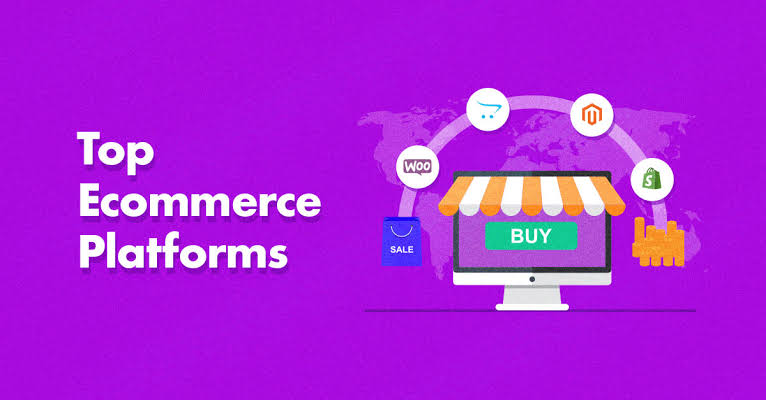The rise of e-commerce has transformed retail landscape allowing businesses to reach global audience with ease. Selecting right e-commerce platform is crucial for success of an online store. It affects everything from user experience to inventory management and marketing capabilities. Here, we explore top 10 e-commerce platforms that provide robust features. They offer scalability. Flexibility helps businesses thrive in competitive online marketplace.
1. Shopify
Shopify is one of most popular e-commerce platforms known for its user-friendly interface and extensive app ecosystem. It caters to businesses of all sizes. Offering customizable templates, easy-to-use tools and range of integrations with third-party apps. Shopify supports various payment gateways shipping options and marketing tools. Making it comprehensive solution for online stores. Its scalability allows businesses to grow without needing to switch platforms. Its robust customer support ensures help is always available.
2. WooCommerce
WooCommerce is powerful e-commerce plugin for WordPress. It offers flexibility and control over online store operations. Ideal for businesses already using WordPress for their website it integrates seamlessly and provides extensive customization options. WooCommerce is open-source. Developers can modify and extend its functionality according to specific needs. With wide range of plugins and themes, businesses can create tailored shopping experience for their customers.
3. BigCommerce
BigCommerce is robust e-commerce platform designed for scalability and growth. It provides range of built-in features. These include SEO tools. The platform also supports multi-channel selling and advanced analytics. BigCommerce supports both B2B and B2C businesses. It offers flexible API that enables integration with various business systems. Its user-friendly interface and comprehensive support make it excellent choice for businesses. Especially those looking to expand their online presence.
4. Magento
Magento, an Adobe company, is a highly flexible and customizable e-commerce platform suitable for large enterprises and businesses with complex needs. It offers powerful features such as advanced SEO, marketing tools, and detailed analytics. Magento’s open-source nature allows developers to create highly tailored solutions, though it requires more technical expertise compared to other platforms. Its scalability and performance make it ideal for businesses expecting significant growth and high traffic.
5. Wix eCommerce
Wix eCommerce is a popular choice for small to medium-sized businesses due to its intuitive drag-and-drop builder and affordable pricing plans. It offers a range of beautiful templates, mobile optimization, and essential e-commerce features like secure payment processing, inventory management, and marketing tools. Wix’s user-friendly interface makes it easy for anyone to create a professional online store without needing extensive technical skills.
6. Squarespace
Squarespace is known for its stunning design templates and ease of use, making it a great option for creative professionals and small businesses. Its e-commerce functionality includes features like inventory management, payment processing, and customizable product pages. Squarespace also offers robust blogging and content management capabilities, making it suitable for businesses that want to integrate content marketing with their online store.
7. PrestaShop
PrestaShop is an open-source e-commerce platform that offers extensive customization and flexibility. It provides a range of features, including product management, multi-store capabilities, and SEO tools. PrestaShop’s modular architecture allows businesses to add new features and functionalities as needed. While it requires some technical knowledge to set up and manage, it is a powerful option for businesses looking for a customizable and scalable solution.
8. OpenCart
OpenCart is another open-source e-commerce platform that offers a user-friendly interface and a wide range of features. It supports multiple languages and currencies, making it suitable for businesses with a global customer base. OpenCart’s marketplace offers numerous extensions and themes, allowing businesses to tailor their online stores to specific needs. Its straightforward setup and management make it a popular choice for small to medium-sized businesses.
9. Volusion
Volusion is an all-in-one e-commerce platform that provides a comprehensive set of tools for building and managing online stores. It offers features such as inventory management, payment processing, and marketing tools. Volusion’s user-friendly interface and built-in SEO capabilities make it easy for businesses to create and optimize their online presence. While it may not offer as many customization options as some other platforms, its simplicity and efficiency make it a solid choice for small businesses.
10. Shopify Plus
Shopify Plus is an enterprise-level version of Shopify designed for high-growth businesses and large enterprises. It offers all the features of Shopify, along with additional capabilities such as advanced automation, higher API limits, and dedicated support. Shopify Plus is ideal for businesses looking to scale rapidly and manage high volumes of traffic and transactions. Its robust infrastructure and comprehensive tools make it a preferred choice for large-scale e-commerce operations.
Conclusion
Selecting the right e-commerce platform is critical for the success of an online store. Each of the platforms discussed offers unique features and capabilities tailored to different business needs and sizes. Whether you are a small business owner looking for an easy-to-use solution like Wix eCommerce or an enterprise seeking a scalable platform like Shopify Plus, there is an option that fits your requirements. By understanding the strengths and offerings of these top 10 e-commerce platforms, businesses can make informed decisions and build successful online stores that cater to their target audiences and drive growth
